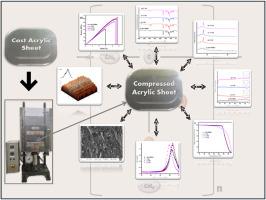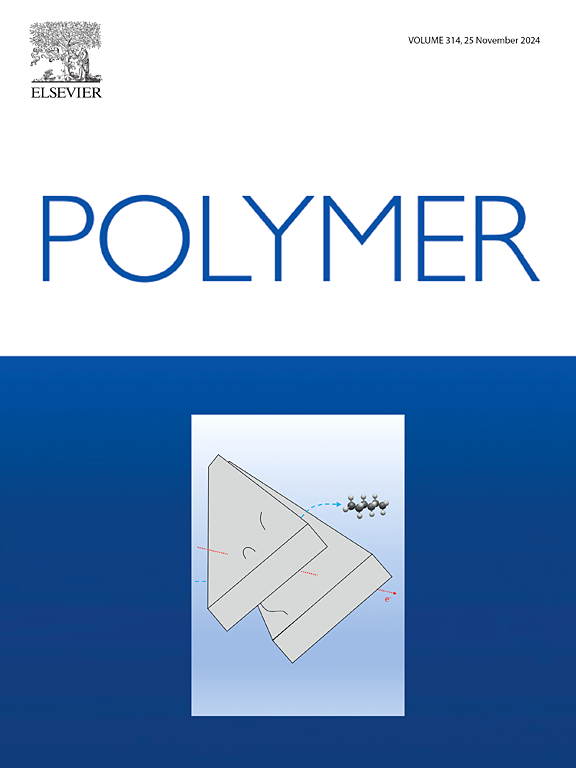Compression induced molecular orientation and crystallization: Enhancing the thermal and mechanical properties of PMMA for aircraft interiors
IF 4.1
2区 化学
Q2 POLYMER SCIENCE
引用次数: 0
Abstract
This study proposes a new approach to improving the properties of cast acrylic sheets (PMMA) through controlled post-processing compression. We significantly strengthened the material's thermal stability, mechanical performance, and morphological characteristics by applying compression below and beyond the glass transition temperature. Compression increased crystallinity by 1.32 % and reduced crystallite size by 41.81 % without altering the polymer's chemical composition. This rise in crystallinity resulted in a minor elevation of Tg for samples compressed below Tg, indicating better chain alignment. Thermogravimetric analysis (TGA) revealed enhanced thermal stability for samples compressed at 100 °C, demonstrating the potential for high-temperature applications. FESEM surface morphology revealed a brittle-to-ductile transition at 120 °C, accompanied by reduced surface roughness, as confirmed by AFM. Mechanically, compressed PMMA exhibited an 89.3 % increase in storage modulus at 120 °C, a 73.55 % rise in flexural strength, along with a 17.34 % improvement in tensile strength and a 25.86 % boost in damping capacity. These findings underscore the method's effectiveness in optimizing PMMA for aerospace and other industries demanding superior thermal stability and mechanical performance.

压缩诱导分子取向和结晶:提高飞机内饰用PMMA的热力学性能
本研究提出了一种通过控制后处理压缩来改善铸造亚克力板(PMMA)性能的新方法。我们通过在玻璃化转变温度以下和以上施加压缩,显著增强了材料的热稳定性、机械性能和形态特征。压缩在不改变聚合物化学成分的情况下,使结晶度提高了1.32%,晶体尺寸减小了41.81%。结晶度的上升导致Tg在Tg以下压缩的样品中略有升高,表明链排列更好。热重分析(TGA)显示,在100°C下压缩样品的热稳定性增强,证明了高温应用的潜力。在120°C时,FESEM表面形貌显示出脆性到韧性的转变,伴随着AFM证实的表面粗糙度降低。机械上,压缩PMMA在120°C时的存储模量增加了89.3%,弯曲强度增加了73.55%,拉伸强度提高了17.34%,阻尼能力提高了25.86%。这些发现强调了该方法在优化航空航天和其他需要卓越热稳定性和机械性能的行业的PMMA方面的有效性。
本文章由计算机程序翻译,如有差异,请以英文原文为准。
求助全文
约1分钟内获得全文
求助全文
来源期刊

Polymer
化学-高分子科学
CiteScore
7.90
自引率
8.70%
发文量
959
审稿时长
32 days
期刊介绍:
Polymer is an interdisciplinary journal dedicated to publishing innovative and significant advances in Polymer Physics, Chemistry and Technology. We welcome submissions on polymer hybrids, nanocomposites, characterisation and self-assembly. Polymer also publishes work on the technological application of polymers in energy and optoelectronics.
The main scope is covered but not limited to the following core areas:
Polymer Materials
Nanocomposites and hybrid nanomaterials
Polymer blends, films, fibres, networks and porous materials
Physical Characterization
Characterisation, modelling and simulation* of molecular and materials properties in bulk, solution, and thin films
Polymer Engineering
Advanced multiscale processing methods
Polymer Synthesis, Modification and Self-assembly
Including designer polymer architectures, mechanisms and kinetics, and supramolecular polymerization
Technological Applications
Polymers for energy generation and storage
Polymer membranes for separation technology
Polymers for opto- and microelectronics.
 求助内容:
求助内容: 应助结果提醒方式:
应助结果提醒方式:


